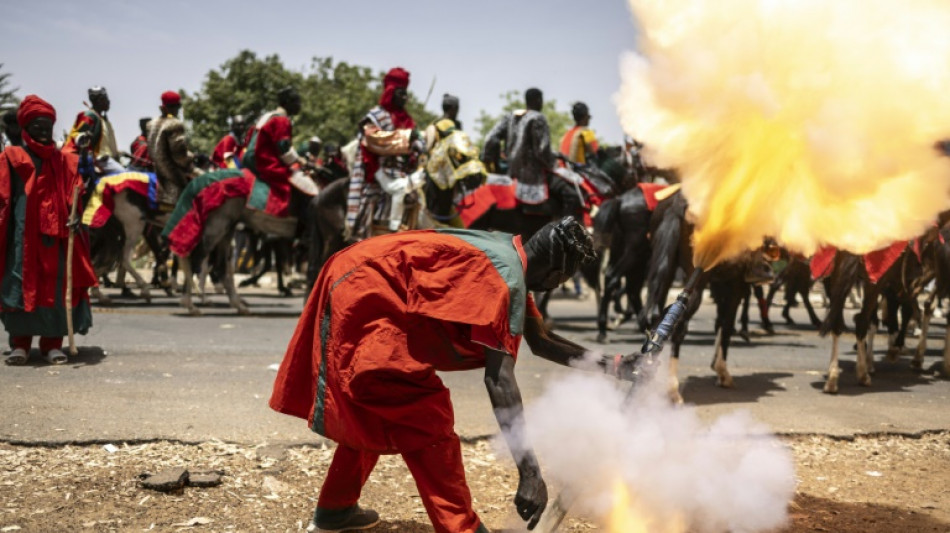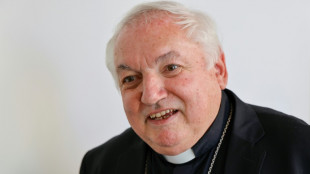

Trumpets, guns, horses: northern Nigeria's Durbar ends Ramadan in style
Veiled women ululated as the blare of trumpets and booms of hunting guns filled the air, heralding the approach of the emir in a huge procession of horseback riders draped in colourful robes and turbans.
Durbar, a festivities-filled procession held each Eid, saw Emir Hameem Nuhu Sunusi, of the Jigawa state capital Dutse, ride through his city as traditional leaders across the rest of Nigeria's Muslim-majority north did the same.
In Dutse -- also the capital of the Dutse emirate -- the UNESCO-recognised fete had residents dressed to the nines as they lined the streets, raising clenched fists in homage to the emir amid drumming, singing and dancing by royal troupes and thousands of horsemen.
Drenched in sweat, the troupes Monday danced to the drums in a frenzy, while royal guards dressed in their hallmark robes of red and green flanked the emir, seated on a white stallion under a blue parasol to shield him from the scorching west African sun.
On Tuesday, the festivities marking the end of the austerity of Ramadan continue, with the emir making a tour of the city to meet residents.
Durbar "spices up the Eid celebrations," spectator Awwal Adamu, a 27-year-old undergraduate said, one of the thousands in the throng.
It also showcases Nigeria's rich cultural heritage -- often overshadowed by the north's myriad armed conflicts, Emir Sunusi told AFP afterwards in his palace.
- Airing of grievances -
Durbar takes place twice a year, on the Eid al-Fitr and Eid al-Adha holidays celebrated worldwide in the Islamic calendar.
The festival dates back to the 15th century, originating in Kano, the north's largest city.
But this year, Sunusi stole the show from Kano, which cancelled its Durbar for the second time in a row due to a legal tussle between two rival royals contesting the emir's throne.
Nigeria's traditional rulers have no constitutional powers but are important cultural custodians, wielding enormous influence that is crucial for politicians wishing to win election to the country's secular federal government.
Monday's procession culminated with the governor, Umar Namadi, receiving the emir and his entourage outside his office -- as daring young men perched on gnarled boughs of baobab trees overlooking the pavilion to watch.
Seated next to Namadi, Sunusi received homage from his 26 district heads, who took turns to greet the monarch by squatting on all fours in royal obeisance.
Each contingent of the procession led by the district heads "has its own different system of decoration for the horses and the horse riders," Wada Alhaji, the chief of staff to the emir, told AFP.
"The different displays showcase the rich diversity within the emirate."
Durbar is not just a cultural festival -- it is also an avenue for the emir to lodge his people's complaints to the government.
The emir told Namadi about the menace of erosion and flooding affecting some areas in the emirate, and the people's call on the government to expedite work on a new police training college.
- Pride of the north -
Dutse resident Khadija Ibrahim called the Durbar "the most interesting part of the Eid festivity".
"I can't imagine the Eid without the Durbar," said the 45-year old-mother of eight.
The event, which draws onlookers and well-wishers from across Nigeria, as well as foreign tourists, "is part of the things we are proud of", Emir Sunusi told AFP.
"In lots of places when you talk about Nigeria, it is negative things that come to mind," the 46-year-old monarch said. "I feel we are not judged fairly."
Sunusi said he hopes the Durbar can change the negative perception of Nigeria abroad and help attract more tourists who would be able to see the "good people, peace-loving, honest people" of the country's north, where the rural hinterlands have been beset by years of armed conflict.
Durbar, added to UNESCO's list of intangible cultural heritage, tells a fuller, more complex story of the north.
"Once UNESCO recognises you it means you will be known all across the world," Sunusi said.
"This will help us a lot in making other people know us more."
F.Thill--RTC


